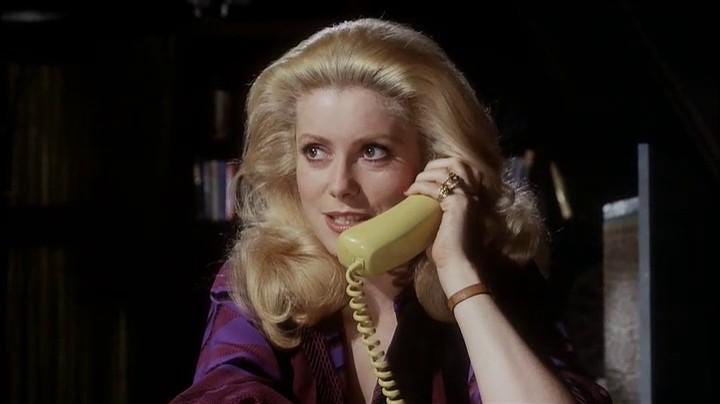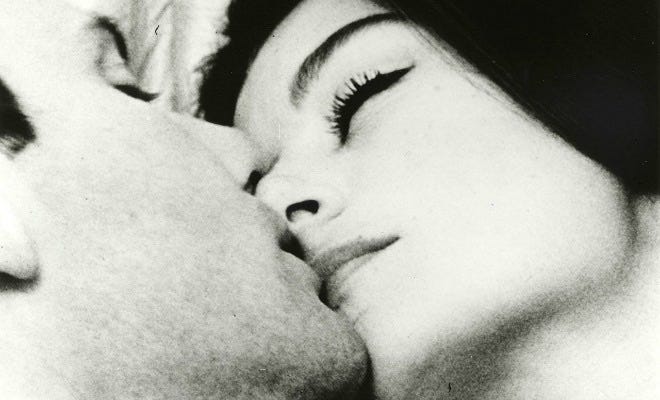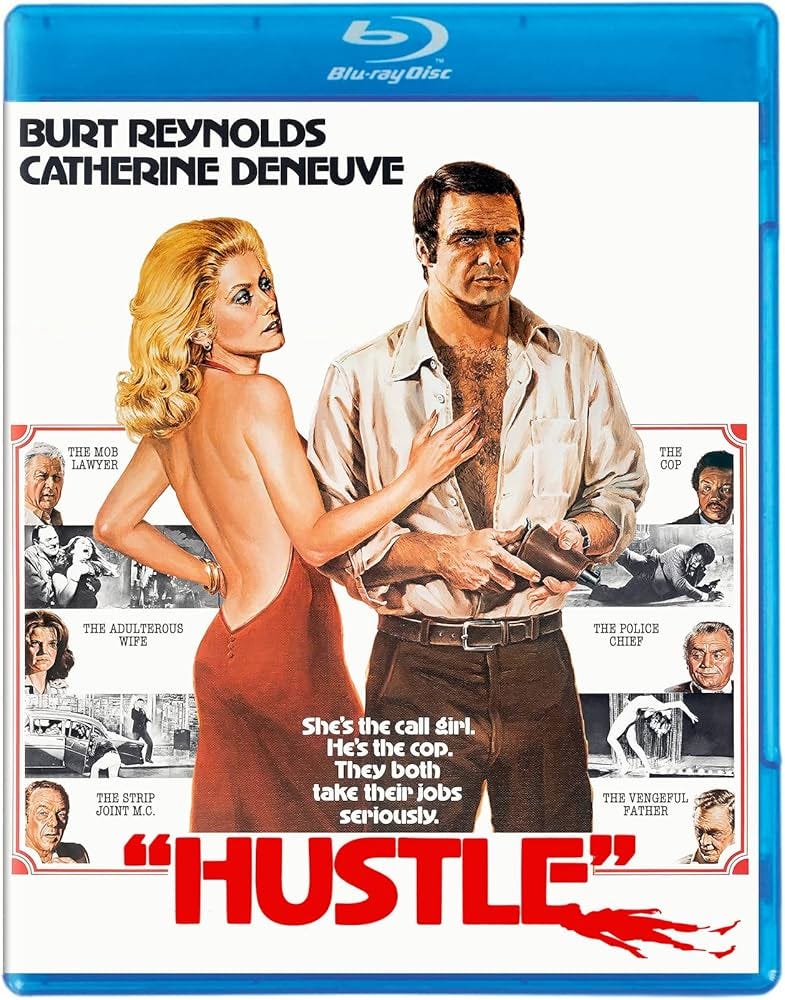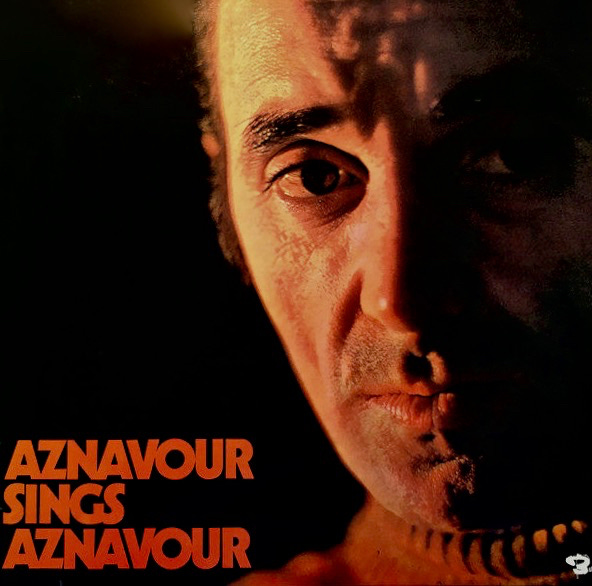Hustle (1975)
'Guatemala with colour television...'
If ever there was a WEEKEND FLICKS. actress, it’s Catherine Deneuve. Yet, trawling through the archive, I’m amazed that we have yet to cover any of her films. Until now. So for today’s post (which, as always on a Sunday, can be read by everybody), I’m going for Robert Aldrich’s Hustle— from 1975— a terrific film (I can’t stress that enough) which you may or may not have heard of. If you haven’t, and you enjoy Cinema for Grown Ups, this one’s for you.
Hustle (1975) is set in contemporary Los Angeles, the Los Angeles of Lootenant Columbo (it shares one, possibly two locations), but a bit like the yin and the yang, a city of opposing opposites, yet curiously part of the same. In Columbo, it’s always sunny; in Hustle, it always rains: a gritty, seedy Los Angeles, ‘Guatemala with colour television’, of crime, poverty, prostitution, strip joints, and drug-crazed, gun-touting punks, where the police beat up suspects and feign casual indifference in the morgue. In this neo-noir world, filing cabinets house a bottle of bourbon as a matter of course. According to a US government website, between 1970 and 1979, I quote, ‘4,950 criminal homicides occurred in Los Angeles, an average rate of 17.1 homicides/100,000 population’. This was an America of lost self-confidence. The death of the American Dream. Druggy psychedelia, Vietnam and the shocking Bianca-Tate Murders (after which it was no longer safe to keep your front door unlocked) culminated in the Fuel Crisis and Watergate, the year Hustle was made— the California of Guess Who’s Coming to Dinner (1967) as if from another planet, yet weirdly, only eight years separate the two films.
Burt Reynolds (in a brilliantly subtle performance) stars as Police Lieutenant Phil Gaines, an early forty-something, world-weary, understandably stressed detective (in the homicide division); Catherine Deneuve as his sophisticated French girlfriend, Nicole Britton. They’re a handsome, grown-up couple— sharing a (relatively) modest but desirable house: a sort of wooden cabin, tree-house thing, perched high in the Hollywood Hills or above a canyon (actually, an architecturally interesting A-frame house, 2301 El Contendo Drive, in the Hollywood Dell, built 1962), with a terrace and a trendy 70s interior, like an Americanised Biba: fashionable 70s nick-nacks and a well-stocked bar (Cutty Sark), poly-satin sheets, rattan curtains, a Peacock chair and palms, Spanish colonial antiques, an avocado telephone, white painted French café chairs in wrought iron, a television set in the bedroom and a Chinese ‘take-out’. And all’s fine and dandy. Except it isn’t. Nicole’s a high-class hooker with an especially competent line in telephone sex, and Phil, understandably, ain’t happy. Despite their strange, rather cynical deal. “You do your thing, babe, and I’ll do mine.” As they remind each other, “A policeman and a call-girl. The world’s oldest professions.”
These are two fundamentally decent and likeable people trapped by circumstance and lack of money (Phil’s paying alimony through no fault of his own). Yet, they dream of a better life together, in Rome or Paris— an escape from the squalor and seediness of the shadowy, nether worlds they both inhabit. Phil keeps a 1968 Pan Am calendar of Rome against the nicotined walls of his office, and throughout the film, there are numerous and constant cultural references— to music, film and television.
I believe in watching television for television's sake, as opposed to background noise (a deeply unfashionable attitude, I suspect, which lumps me with the Norman Conquest). It strikes me that the residents of Los Angeles not only seem to have a television set in every room but also like to keep their sets switched on all the time, even if nobody's actually watching it. And in Hustle, likewise, there's television in every corner: from Branded (1950) to Moby Dick (1956), to some sort of monkey cartoon (Hanna-Barbera?) in a gangster's office, to Mission Impossible. On their Hi-Fidelity equipment, Phil and Nicole play romantic, bittersweet Euro-chic numbers incessantly, especially Charles Aznavour's classic Yesterday, When I Was Young (Hier Encore) (1964), and Phil takes Nicole to see Un Homme et une Femme (1966) at the art house Plaza cinema on Glendon Avenue, Westwood Village. But if Phil imagines himself as a Jean-Louis Trintignant against Nicole's Anouk Aimée, this was still a time when travel was beyond the reach of many— for the mass-market Boeing 747 Jumbo Jet only made its first commercial flight in 1970. It's a View-Master interpretation, isn't it? Exotic Europe in Kodachrome: slides of the Spanish steps, that kooky little restaurant in Montmartre, a romantic, candle-lit bateau-mouche on the Seine.
And this, I think, is what makes Hustle special. The character development elevates what might otherwise be a routine mid-70s film-noirish crime thriller. Good on Catherine Deneuve for taking it on. Hustle's sexploitation, shock-jock film poster, ‘the mob lawyer who got his kicks in the strangest ways', 'the strip-joint MC: he catered orgies for the rich', ‘the adulterous wife: when her husband went off to war she went off with another man’, features a sexy red mini dress, Catherine Deneuve’s manicured nails and Burt's manly chest wig, and the imaginative tag-line, 'They're Hot'. Columbo meets Caligula. Oh, disappointment! For Hustle’s actually a fundamentally serious, sophisticated and ultimately moving film, a picture, perhaps, which might appeal as much to the art house crowd, as to the flea-pit habituées— admirers of Venus in Furs (1969), in which a jazz trumpeter becomes obsessed with a beautiful woman whose corpse he discovers on a beach, or Eugenie de Sade (1973), in which, 'after a bashful young woman discovers that her famed wordsmith stepfather is a psychopathic deviant, she becomes his accomplice in his murderous sex games’.
The plot, otherwise, is tight, believable and relatively straightforward. The body of a twenty-something go-go dancer is washed up on a beach, seemingly from a barbiturate overdose. Nothing especially unusual about that in 1975 Los Angeles. But then her estranged father, Marty Hollinger (Ben Johnson), a psychologically disturbed Korean War veteran, forces the police's hand, and, as events unravel, the poor girl's death leads to a string of mobster connexions, including a rich, WASPy crooked lawyer, Leo Sellers, (Eddie Albert)— who not only happens to be one of Nicole's top clients, but lives in Thornton Gardens, San Marino, a Cluedobeathan half-timbered ‘mansion’, built in the 1920s and used in Funny Girl (1968) and various episodes of Columbo. In contrast to Leo Sellers, the girl's parents are 'middle-class nobodies'. The brilliant Eileen Brennan, one of America's great character actors (The Sting), is especially touching here. As Marty's haggard, downtrodden, chain-smoking, hard-drinking wife, trapped in a marriage to a damaged, obsessive husband. And as with the constant television sets, this is a hard-drinking Los Angeles, with a bar in every sitting room, or failing that, a bar in every street (lit by neon), where you go to drown your sorrows. In the rain.
Hustle (1975) received mixed reviews from the critics, with Gene Siskel of The Chicago Times awarding it a full four stars out of four, writing that the ‘violence takes a back seat to character development and storytelling techniques that are classical. Hustle is the kind of picture you don't want to see end. It's going to be a cult favorite’.
Others were less kind. Arthur D. Murphy of Variety wrote, ‘Because of some over-contrivances in plot, excess crassness and distended length, Hustle misses being the excellent contemporary Bogart- Chandler- Hawks- Warner Bros. cynical urban crime-and- corruption melodrama it so obviously emulates. However, Robert Aldrich's sharp-looking film has an outstanding cast, well directed to sustain interest through most of its 120 minutes’. Gary Arnold of The Washington Post describing it as ‘stale baloney’.
Well. I’m with Gene Siskel. And I think certain films start to make sense fifty years later. Time is a Kind Friend. Despite the rain, Hustle (1975) is subtle and intelligent, and has something to say for itself. And there’s terrific acting all round. And oh, how the camera loves Catherine Deneuve!— it’s hard to take your eyes off her. And the ending is genuinely moving and desperately sad. This is a film for Grown Ups. It’s a personal favourite. It’s in my All Time Top Twenty.
I watched Hustle (1975) on Amazon Prime Digital Download for a few quid. And I am glad that I did. I’m also pleased to report that Hustle is now available on DVD and Blu-ray— and the Blu-ray version includes the original film poster on the front of the box.
You’ve just been reading a newsletter for both free and 'paid-for' subscribers. I hope you enjoyed it. Thank you to all those of you who have signed up so far.
There are two options on Luke Honey’s WEEKEND FLICKS. Cinema for Grown Ups: ‘Paid-for’ subscribers get an extra exclusive film recommendation every Friday morning, plus full access to the complete archive— which is currently at film no. 80, and should list over a hundred films by the end of the year. It costs £5 a month (or £50 a year)— a bargain, frankly, when you compare it to a few cups of coffee, a packet of semi-legal gaspers, or a pint of beer in the pub. ‘Free’ subscribers get access to the Sunday newsletter, plus the ‘free subscriber’ films in the archive. Either option is a good bet. And when I get my act together, I’m planning to add a spoken voiceover (mine!) for paid subscribers.
I will be back next Friday. In the meantime, I hope you have a relaxing and cinematic Sunday. Negronis for this one…
.
.









We watched two Paul Newman films this weekend in our regular 'educate my son' campaign: The Hustler, and The Verdict. Both good of their time, and Newman is a fantastic actor. But both were spoiled for us by a completely unnecessary and out of character moment of violence, when Newman punched his female lead hard in the face, respectively Piper Laurie and Charlotte Rampling, knocking them down. Extraordinary how our attitudes have changed. Really shocking to see.
I’m going to watch it this week. Thanks.